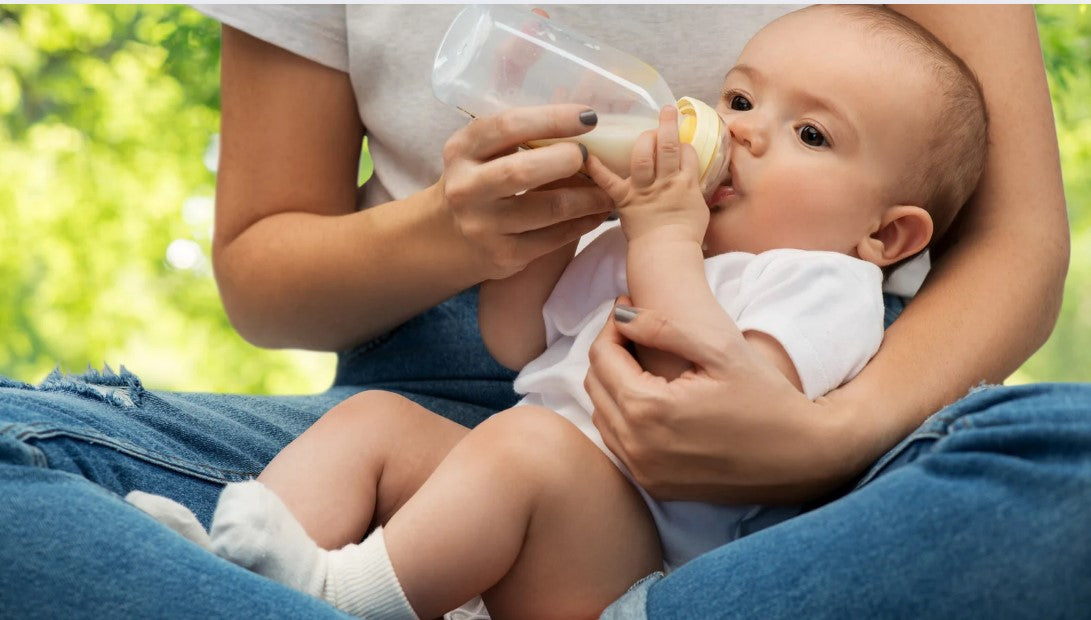When we think about the first part of a child’s life, one word comes to mind: nourishment. Parents do everything they can to give their new baby the best start in life and help them grow up healthy, strong and full of potential. But what if one of the most ubiquitous substitutes for breast milk baby formula is instead relegating children to a lifetime of poor health and bad habits?
This is where the talk about toxic sugar binge commences.
The Sugar Lurking in Your Baby’s Formula
Many parents believe baby formula is a precise and nearly perfect replacement for breast milk. It does have nutrients in it but the sugar content is often overlooked.
Unfortunately, high levels of sugars – such as corn syrup solids; maltodextrin; or sucrose (table sugar) are found many baby formulas. These sugars are not included because they add health, but to render the formula sweeter and more palatable for babies.
This begs an extremely important question: are we training infants’ taste buds to enjoy sugar from the very start?
Sugar Cravings Begin Early
Babies are also biologically predisposed towards liking sweet tastes. Breast milk is already naturally sweet because it includes lactose, a natural, slow-digesting sugar. But the distinction is in the sugar quality and kind.
Lactose in breast milk is good for steady energy levels and brain development. On the other hand, many formulas have whopping amounts of refined sugars in them, which send your blood sugar skyrocketing up very quickly and that’s why you get a big “rush” followed by a crash. This roller-coaster effect adds up over time, and the child starts craving sweeter foods.
Around the time that most toddlers are weaned from breast milk or formula, their taste preferences begin to be influenced more by the other foods and flavors they’re offered.
The Risks Of An Early Sugar Overload To Health
The early years of life are the most important for constructing a strong structure. But when sugar becomes a regular part of a baby’s eating regimen, the long-term dangers increase substantially:
Childhood Obesity: Chronic high sugar consumption forces the body to consume more than the daily recommended calories, which potentially causes obesity in children.
Type 2 Diabetes: Sugar exposure at a young age conditions the body to process high amounts of glucose, setting up the possibility for insulin resistance later.
Low Immunity:High levels of sugar in the blood reduce the efficiency of white cells, responsible for infection control rendering your child susceptible to germs.
Tooth decay: Before permanent teeth have even erupted, sugar can help unwanted bacteria grow in the mouth.
Food Addiction in the Making: Research indicates that exposure to sugars at an early age can rewire the brain’s reward centers, leading children to be more susceptible for food addiction as they develop.
The scary truth? Following are suggestions about how parents can protect their vulnerable infants to the most risks of fake infant formula they do not even realize endanger their babies, just because they rely upon “baby formula” as a safe and healthy product.
Marketing vs. Reality
Baby formula firms devote untold billions to marketing, promoting their goods as the closest thing to breast milk. If you have only one of these products on hand when a poop explodes, run it under warm water (do not vigorously scrub) and let it soak for 30 minutes to clean. Healthful-sounding labelsProducts often tout words like “fortified, nutrient-rich and gentle for babies.
But what they don’t emphasize in bold type is the quantity and type of sugar inside that can. A parent may feel he is being very discerning, when in fact he is initiating his baby into one of the prime dietary villains in the cause of present-day health problems.
That’s why it is important to read ingredient labels carefully. Words like “corn syrup solids” or “maltodextrin” may not seem scary, but they’re refined sugars that offer zero to minimal nutritional value.
What Parents Can Do
And though some parents may not be able to breastfeed, there are measures to avoid the potential sugar overload in formula:
Choose Formula Wisely: Go for formulas that are free from added sugars and made with lactose as the primary carbohydrate.
Cap Processed Baby Foods: Do not offer jars or pouches that have hidden sugars once starting solids. Real food, real whole food is always best.
Learn What Ingredients Are: Don’t be duped by marketing material turn the jar and read the fine print.
Start with Healthy Tastes Early: Start baby off right by offering fruits, vegetables and grains as healthy first foods who’s tastes never have to be acquired.
Promote Water Over Juice: Ditch the semisweet juices that are just too sweet for toddlers’ young taste buds. Water and fresh fruit are more healthful.
Building a Healthier Future
All parents want their children to grow up strong, healthy and free from preventable diseases. When you make thoughtful decisions about what your baby puts in her body from day one, it isn’t just short-term sugar spikes that you’re preventing it’s protection for a lifetime of health
Interrupting the cycle of toxic sugar overload begins with awareness. By understanding that baby formula can be just one on a series of steps toward a sugar-soaked future, parents may make wiser choices and demand more from the food industry.
Final Thoughts
A child’s path to health starts sooner than most people realize. Baby formula, convenient and at times necessary, can also be a culprit of hidden dangers in its ingredients. By sugar-soaking babies, we are creating children who may be going down a path toward obesity and later disease risk that is avoidable.
But awareness changes everything. With that knowledge, parents can make smarter decisions and demand higher-quality products. But remember: every bite counts, and the choices you make today will impact your child’s future for decades to come
Ready to begin your fitness journey?
Amazon Shop Click Here
Website Click Here
Youtube Click Here



